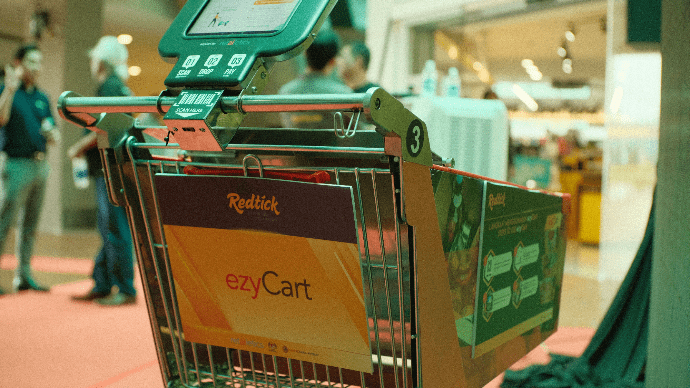The AI-powered shopping cart ezyCart offers personalised promotions, rewards, and in-cart self-check-out payments


As weekly grocery shoppers, Manirajah Kulanthavelu and Shaji Rajappan were frustrated with the time they had to spend just locating products in the store and lining up in slow-moving checkout queues to pay. Despite these frustrations, they felt online grocery shopping could never match the in-store shopping experience.
With previous experience building companies, the duo sensed an opportunity to enhance the relationship between the retail outlet and the customer.
“We both shared similar ideas of how we wanted to enhance our weekly shopping experience. So, we interviewed hundreds of shoppers inside supermarkets, as well as senior executives and owners of major retail chains in Malaysia and Asia,” says Shaji. “This was the beginning of Retailetics.”
Retailetics — a combination of ‘retail’ and ‘analytics’ — is a retail automation company addressing the challenges of retailers and shoppers.
The startup has developed a smart cart called ezyCart. An AI-powered shopping cart, ezyCart enables supermarkets to seamlessly engage shoppers and deliver personalised in-store experiences while generating rich insights into everything shoppers do between the aisles. “ezyCart offers personalised promotions, rewards, cashless and in-cart self check-out payments, and insights into how the consumer shops,” Shaji remarks.
In a nutshell, Retailetics delivers four things: new footfall into the store (primarily driven by curiosity and desire for change), great shopping experiences for shoppers, and real-time insights and capabilities for retailers to sell more to consumers inside the store (captive audience).
The company operates in Malaysia and has just launched its first few pilots. It has letters of intent (LOIs) from four Malaysian retail chains today that allow the startup access to a total of 120 hyper and supermarkets. The firm plans to deploy small volumes of smart carts in their urban stores first, followed by the rest, as it raises more money to ramp up the cart production.
“We also have an LOI from a big retailer in the Kingdom of Saudi Arabia that is keen to test our product in 2023,” claims Shaji, who comes from an enterprise CRM and CX background and previously founded Inxider, an analytics company.


Several major retailers in Thailand, the Philippines, Indonesia, India, and Australia have also expressed interest in the pilot.
Retailetics banks on a subscription model, allowing retailers to deploy its tech by signing a contract for either 36, 48 or 60 months, during which they’d pay a monthly subscription fee (billed quarterly). This gives them access to the smart carts, cloud software and apps, dashboards and supporting technology infrastructure inside each store, and maintenance of the carts.
“Besides subscriptions, we generate revenue from advertising on the cart’s physical surface (cart-wrap), as well as digital aisle-based advertisements on the cart’s screen, and also our ezyList mobile app,” says Co-Founder Manirajah, who earlier built an e-wallet startup which he exited in 2017.
According to him, Retailetics faces several challenges, including the lack of access to venture funding and government support, besides finding good, disciplined, all-rounder knowledge workers such as high-end developers and engineers.
“As for funding, most VCs do not invest in startups they consider a hardware play. Yet, they communicate that to us using hardware such as mobile phones, tablets and computers,” Manirajah quips. “They also need to understand traditional retail and take the trouble to spend time with us to learn enough. Retail is a significant B2B segment as a single contract gives us access to their entire chain of stores. It is also a segment that millions of people buy products from every second.”
“Funnily, take your eyes off our hardware; you will realise we are a data company that generates valuable real-time insights across the entire shopper journey, from home to store and from the list to checkout. Not many companies can claim to do that,” Manirajah says.
The company raised initial capital from angel investors, including Suresh Thiru (former COO of Jobstreet.com and later CEO of SEEK Asia) and Bikesh Lakhmichand (CEO of 1337 Ventures) via a SAFE (simple agreement for future equity) round managed by 1337 Ventures. Several undisclosed investors from Malaysia, Singapore, India, Australia, and the US participated.
While there are no direct competitors in Malaysia, globally, there are companies in the smart cart segment, such as Caper (acquired by Instacart), A2Z (acquired by a NASDAQ-listed company), and Imagr (a Kiwi startup funded by Toshiba Ventures and uses Toshiba’s patented AI tech to power their smart baskets and carts).
“Our biggest competitor is cheap labour. But if you remove everything else we do and deliver and focus on just self-checkout, there are a slew of self-checkout technologies that retailers, even in Malaysia, have deployed,” Manirajah shares.
With the COVID-19 scare gone and offline shopping back in full swing, competition in the retail industry is growing strong. Only retailers that can enhance customers’ shopping experience will win the game in the highly digitalized era. Perhaps, Retailetics’s ezyCart could play a crucial role here as it benefits retailers and shoppers alike.



Leave a Comment